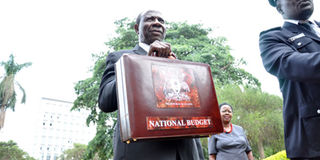Civil society faults govt on budget implementation

Finance minister Matia Kasaija shows a briefcase containing the National Budget at Kampala Serena recently. FILE PHOTO
What you need to know:
Cited. Lack of proper interface between politicians and technocrats is one of the reasons
Kampala.
As Parliament peruses the proposed 2017/18 Budget, activists in civil society have expressed concern over government’s failure to implement national budgets despite good budgetary allocations.
“Government has been responsive in the way they allocate money to sectors like in infrastructure, agriculture, tourism but these are just on paper. When you go down to budgetary performance report, performance is very poor,” Mr Ramadhan Goobi, a senior economist, said on the sidelines of the pre-budget dialogue on the National Budget 2017/18 organised by Civil Society Budget Advocacy Group(CSBAG) at Makerere University on Tuesday.
He explained that the “chaotic interface” between politicians and technocrats has left most budgetary work undone as responsible people protect their mandate (budget).
“The two teams cannot work together. The director of finance may have a good budget but the people who are supposed to implement it on ground do not work on it,” Mr Goobi said.
He questioned continuous budget allocation to underperforming sectors and warned that the proposed Budget will not benefit the country as long as the government continues to use inefficient people.
CSBAG executive director Julius Mukunda attributed the poor implementation of the Budget to poor planning.
Mr Mukunda explained that there are districts that have capital expenses which they have not procured for. When the money is sent to the accounts, they start procurement processes which take about three months.
He also said that some districts are remitting money due to low capacity to absorb the allocated budget.
“You send money to Mayuge which has a staffing capacity of 40 per cent and as such, the people to implement the work are not there so money returns to the centre,” Mr Mukunda said.
Cost of poor implementation
Government continues to incur unnecessary expenses out of negligence of inefficient public servants. According to CSBAG, more than Shs6b is considered nugatory expenditure in the last financial year.
Mr Robert Sekate, an economist from the ministry of Finance, Planning and Economic Development, appealed for a change in mindsets of public servants saying the success of budget implementation is as good as the way different players look at it.
Civil society asked government to not only provide strong and regular technical guidance but also use an iron hand in reprimanding non-compliant sectors as there is no time for inefficiencies.
.
Proposed budget
The increase. Government has proposed a Shs30 trillion Budget in the next financial year, an increase from the Shs26.3 trillion National Budget last financial year. According to the ministry of Finance, this gap will be financed by borrowing to majorly boost infrastructural developments. Despite its current budget deficit, government hopes to use its return on investments to pay its debts.



